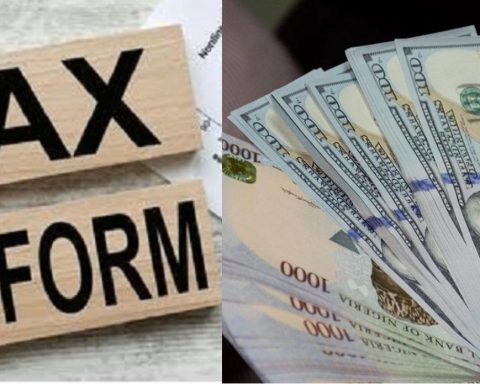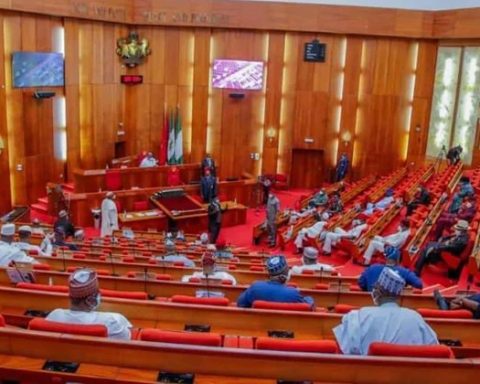Nigeria’s newly enacted tax reforms represent a significant shift in the country’s fiscal policy.
President Bola Tinubu on Thursday signed four new tax laws, marking a transformative approach to taxation aimed at stimulating economic growth, reducing burdens on vulnerable groups, and improving the efficiency of tax administration.
Join our WhatsApp ChannelThe Four New Tax Laws
The new tax laws are: the Nigeria Tax Act (NTA), Tax Administration Act (TAA), Nigeria Revenue Service Act (NRSA), and Joint Revenue Board Act (JRBA).
The Nigeria Tax Act removes more than 50 minor, overlapping taxes and unifies different tax laws into a single, more understandable code. According to the president, doing business will be simpler if taxes are decreased and duplication is removed.
The Tax Administration Act establishes uniform guidelines for the federal, state, and local governments’ tax collection practices.
The Nigeria Revenue Service Act creates the Nigeria Revenue Service (NRS) as a new, independent organisation that replaces the Federal Inland Revenue Service (FIRS).
The Joint Revenue Board Act establishes a Tax Ombudsman and Tax Appeal Tribunal to settle disputes and enhances coordination between the tiers of governments.
What are the Benefits for small-scale businesses and low-income earners?
The new tax laws are expected to have a significant positive impact, especially on low-income individuals, small enterprises, and traders in the informal sector.
The NTA provides tax exemptions for companies and individuals in certain categories.
Personal Income Tax
As provided under Section 30 of the Act, individuals earning up to N1 million per year are given a rent relief of N200,000 or 20 per cent of the annual rent paid. This consequently reduces their taxable income to N800,000. As specified in the Fourth Schedule of the Act, they are no longer qualified to pay income tax.
READ ALSO: New Tax Laws Will Not Raise More Taxes – Oyedele
The schedule, which is on Individual Income Tax rate, stipulated that after the relief allowance and exemptions had been granted in accordance with subsection (1) of section 30 of the Act, those having taxable income of N2.2 million per annum shall pay 15 per cent as income tax, N9 million at 18 per cent, N13 million at 21 per cent, N25 million at 23 per cent and above N50 million at 25 per cent.
This means that people in the low-income bracket will be given the opportunity to have more disposable income, possibly to increase their savings and investments. For higher earners, the system is now fairer, with higher taxes for higher incomes.
The Act also increases the tax exemption threshold for compensation for loss of employment or injury from N10 million to N50 million.
Company Income Tax Exemptions
The new tax law provides that SMEs with annual turnover below ₦50 million are now completely exempt from Company Income Tax (CIT). This is a significant increase from the previous ₦25 million threshold. The small companies will only file simpler returns, without needing audited accounts.
The NTA also exempts small companies from Capital Gains Tax and the newly introduced Development Levy.
READ ALSO: Nigerian Govt Says New Tax Laws Take Effect January 1, 2026
For bigger companies, the tax rate will drop from 30 per cent to 27.5 per cent in 2025, and 25 per cent from 2026 year of assessment. This, according to analysts, creates room for entrepreneurs running small businesses or investing in one to reinvest profits and grow.
Section 203 of the Tax Act (General Interpretation) defines small companies as businesses with a gross turnover of ₦50 million or less and total fixed assets not exceeding ₦250 million, while other companies have an annual gross income exceeding ₦50 million.
VAT Relief On Essential Items
The law also provides for Value Added Tax (VAT) exemptions on essential goods and services to ease the pressure of the rising cost of living. These include food, healthcare, education, residential rent, transport, power, and baby products, among others.
The government also restructured how VAT revenue is shared, with 30 per cent of VAT proceeds distributed based on consumption, 50 per cent shared equally among states, and 20 per cent allocated based on population. This means that 90 per cent is going to states and local governments to benefit local services.
The NTA retains the VAT rate at 7.5 per cent against initial proposals to increase it to 12.5 per cent. However, its scope is expanded.
Chairman of the Presidential Committee on Fiscal Policy and Tax Reforms, Mr Taiwo Oyedele, explained that the decision to remove VAT on essential items is part of the government’s efforts to reduce the burden on the people and also ease inflationary pressure.
He said these areas are where most Nigerians spend more on their basic needs.
READ ALSO: Higher VAT Pushes Govt’s Gross Revenue To N2.085trn In April
“Our analysis, which was very clear, is that these items collectively account for more than 8 per cent of where Nigerians spend their money. That’s a huge relief for them,” Oyedele stated during a briefing of State House Correspondents, after President Tinubu signed the laws on Thursday.
The law creates room for input VAT recovery. Businesses can now claim VAT credits on all purchases, including services and fixed assets, improving cash flow.
Since many low-income households will no longer be required to pay income tax and will also benefit from price reductions on necessities, they stand to gain the most. The VAT exemptions will result in lower expenses for a typical family that spends the majority of its income on rent, food, and transportation.
Additionally, a more efficient bureaucracy should benefit small businesses by increasing compliance and attracting informal traders to the tax system.
With higher VAT now expected on luxury goods and premium services, and capital gains tax levied on large share sales, high-income individuals and luxury consumers may feel the pinch a little.
Elimination of Multiple Taxes and Simplified Compliance
The tax laws unified several small and overlapping taxes, reducing the bureaucratic burden on small businesses.
The laws made provisions that qualifying small businesses no longer need to submit audited accounts and can file simpler tax returns, reducing administrative costs.
The new laws also provide clearer thresholds and classifications for small businesses, eliminating previous ambiguities that complicated compliance.
Additionally, charitable organisations, cooperatives, educational institutions, and places of worship are eligible for tax breaks as long as their revenue is not derived from business ventures.
Structural Improvements Supporting Implementation
The new body of tax laws equally made provisions for structures to support implementation
Reformed Tax Administration: the New Nigeria Revenue Service (NRS): Replaces FIRS with a more autonomous, efficient agency focused on modern collection methods.
Tax Ombudsman: Provides an independent dispute resolution mechanism, protecting taxpayers from overzealous enforcement.
Digital Transformation: The new tax system entrenches a digital innovation in tax collection and remittance to improve efficiency and transparency, and accountability. This includes e-invoicing and automated tax IDs.
Coordinated Federal-State System: The Joint Revenue Board improves harmonisation between different government levels, reducing conflicting tax demands.
Potential Economic Impacts
Analysts have averred that the tax reforms have potential economic impacts in the country.
The tax reforms are projected to increase Nigeria’s tax-to-GDP ratio from 10 per cent to 18 per cent by 2026.
It is also estimated that the reforms would formalize more small businesses by making compliance simpler and more beneficial.
Aside from stimulating consumer spending through increased disposable income, the new tax rules, considered more business-friendly, are expected to attract more investment inflows in the country.
While implementation challenges remain, particularly regarding enforcement practices and digital infrastructure, these reforms represent Nigeria’s most comprehensive tax modernisation effort in decades. By specifically targeting relief to SMEs and workers while improving collection efficiency, the government aims to create a more equitable system that supports economic growth while protecting vulnerable populations.
Victor Ezeja is a passionate journalist with seven years of experience writing on economy, politics and energy. He holds a Master's degree in Mass Communication.














